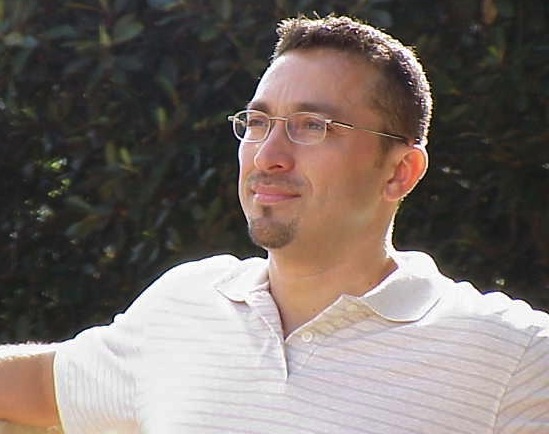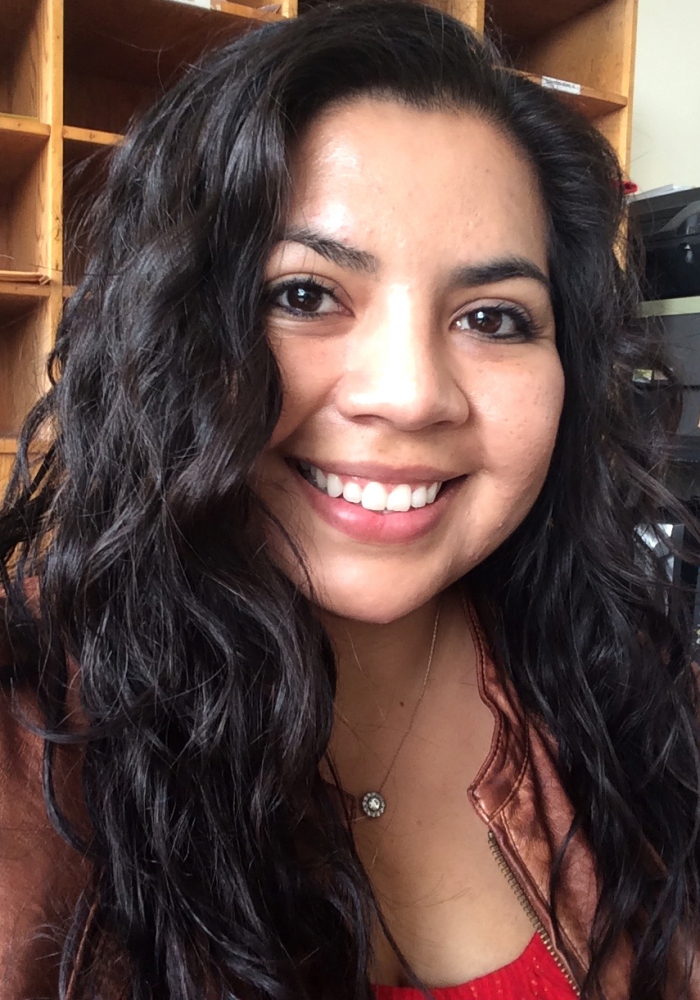
Remembering Horacio Roque Ramirez

There are very few people I have ever met who are as truthful and kind as my former advisor: Dr. Horacio Nelson Roque Ramirez. The news of his passing over the holiday break has devastated me but it has also made me think of the multiple ways his presence at UCSB and in the academy changed my life.
In January 2010, I received a phone call from Horacio. This came a few days after I learned of my admission to work under his direction in the Department of Chicana and Chicano Studies at UC Santa Barbara. He congratulated me and welcomed me to the program, indicating that he was excited about my research areas of interest. He said that work on Central American communities was “much needed” and he hoped to meet me at the admit day program the department scheduled for us.
Although I had read work written by him and had seen his name repeated in the acknowledgements section of almost every book I read in the field of Central American Studies, meeting him in person for the first time in March 2010 was a surreal experience. Not only was my future advisor brilliant, he was hilarious as well.
When he spoke to me, he code-switched from English to Spanish to Caliche [Central American Spanish slang] and back to English. This was the first time I was in the presence of a person with a Ph.D. who was of Salvadoran descent. Although it may seem like an insignificant detail, his ethnic background was more important to me than I could ever hope to describe.
Among all Latinas/os in the U.S., Salvadorans have the lowest levels of educational attainment at every level, including the doctoral level (Pérez Huber et. al. 2006). Horacio’s presence in the academy was not only proof that Salvadorans could hold a doctorate, he was also living proof that it was possible to earn a Ph.D. in an interdisciplinary ethnic studies program and get a tenure-track job at an R-1 institution. This was significant to me because at the time no one had graduated from the Chicana/o Studies Ph.D. program and we did not know what types of placement we could secure with our degrees. In a time of uncertainty, his example gave me hope.
Dr. Horacio Roque Ramirez’s presence at UC Santa Barbara was important and necessary for the development of our undergraduate student body.
Among my fondest memories is experiencing his dynamic and laughter-filled lectures as his Teaching Assistant. In his “Central Americans in the U.S.” course, he assigned banned historical fiction from El Salvador and enthusiastically read some homoerotic passages out loud in class with his own brand of eloquent sass.
He emphasized to students that themes of empire, capitalism, and hetero-masculinity were disrupted throughout this text to the extent that the military came after the author and he fled the country in fear for his life.
He encouraged students to “come out” as Central Americans on the first day of class. Although at first only three students admitted to the classification, by the time the class ended 10 additional students expressed their Central American origin.
In the days since his passing, a handful of students who were in that class have contacted me to share their memories of our professor. Two of the young men I heard from told me that Horacio was the first person to ever validate their lived experiences as gay Salvadoran men through his mere existence. A Guatemalan young man who was our student told me Dr. Roque Ramirez lent him a handwritten notepad of ideas about the Central American wars and the commonalities among Isthmanian people. Our former student told me, “I never had a chance to return his notes,” as we reminisced about the Winter 2012 course. A young woman messaged and explained to me that with his humor and honesty, “Dr. Roque made it OK to be Salvadoran and in the university.” After his class she lost her fear of asking family where they came from and finally learned a rich family history she did not know before.
Another alum told me Horacio’s class changed her life because although she knew she was Salvadoran she did not understand what it meant to be Salvadoran until she sat through the class and learned the history she had never learned elsewhere.
The courses on Central American Studies Horacio developed at UCSB are the reason I came here to pursue a Ph.D. I wandered through my undergraduate years at UCLA questioning why there were no Central American faculty present on campus.
Dr. Roque Ramirez was one of the first Central American professors in the entire UC system and he developed the first Central American Studies courses the UC system has on its catalog, “Central Americans in the U.S./The U.S. in Central America,” and “Salvadoran Diasporas.” These were courses I wished to take and teach. I longed for the knowledge these courses provided in the same way I know others like me longed for them. Our students continue to ask for these courses, demonstrating the desire they have to learn about their history and the history of these regions. Those who were able to take the courses with Horacio remember him warmly and the stories they tell about the central role he played in their life are a testament to his impact.
I experienced many gleeful and challenging moments during my three years as his advisee. Perhaps one of the most vulnerable moments for any new graduate student is the moment when our originally proposed research project shifts based on the information we learn in seminars and the discussions we have with the faculty who teach and mentor us.
After multiple instances of faculty discouraging my interest in Central American issues in seminars and mentoring meetings, I began to shift my sights toward a topic I was told would be more marketable and more in line with the mission and history of the Department of Chicana and Chicano Studies. Like most scholars, I have a barrage of ideas to draw from so I selected my secondary interest and began to read about it. I met with Horacio after months of half-heartedly reformulating my ideas and poorly developing a plan to pursue my new topic. He listened intently to my musings and scribbled notes on the back of an envelope. When I was done talking, he asked, “So … am I to understand that you have completely dropped your research on Central Americans and have taken up a new topic?” When I replied to confirm, he asked, “Why?” I told him my original topic seemed too narrow, too specific, and I feared I would not have a marketable dissertation. He looked at me, he looked at the ceiling – then back at me. He made a grunting noise and let out a quick laugh before asking, “Who told you that your topic is not marketable?” He quickly followed up saying, “No, don’t tell me. It doesn’t matter,” and proceeded to explain to me that there is no way to predict the job market five years or even one year in advance.
Horacio asked me why my original topic was important to me and I explained how painful it was not being able to find books in the library about Central Americans, and not being able to speak freely about Mexican dominance in Latina/o Studies. I told him how painful it was to learn about the genocide of our indigenous ancestors, about the effects of U.S. intervention in our homelands, about the deaths and destruction the civil wars brought to our families, about the ejection of our people from the Isthmus and the dejection their abandonment makes them feel.
I was in tears in his office condemning the trauma and violence our people are subjected to. He handed me a box of tissues and told me that this research was important enough to have me in tears because it came from a place of urgency and love for our communities. He said that the love for our communities and the defense of their human rights was the driving force behind our work. He told me that when we truly care about the work we do and the communities we work with, we will do good work in honor of them. He told me not to worry about being marketable for marketability’s sake. He said, “Do good work and the rest will come.” I reverted to my original line of research and I am on my way to completing my project. I would hope that he knows I am doing my best to do good work.
In the years that I knew him, Horacio collected and interpreted oral history testimonios from members of marginalized queer, transgender, impoverished, and Central American communities. He encouraged us to look beyond truth and facts and to focus on the essence of memory and why people remember things in ways that are important to them. My truth with him, like my truth with anyone, is fragmented and imperfect, but the memory I have of him is of someone who was kind and generous.
More than anything, Horacio wanted us to get along and to help our communities. He gave everything he had. There is not a single person I’ve talked with about Horacio who has not regaled me with stories of Horacio gifting or lending them books, notebooks, or cassette tapes of intellectual material. His mentorship extended beyond setting meetings or reading drafts. He adamantly shared his knowledge to the benefit of all. He treated staff, adjunct faculty, undergraduates, and graduate students with the same respect as a dean or chancellor because he truly understood community and respect. He was a scholar-activist who served as an expert witness in legal asylum court cases. He reveled in the victories granted by our imperfect legal system to queer Central Americans who faced violence had they been returned to their countries of origin. I hope to follow in his footsteps by testifying in the courts some day.
Horacio was not just my advisor. He was my mentor, my role model, my colleague, and my friend. His contributions to academia and to the UCSB campus, his brilliance of spirit and mind, and his resounding gregariousness pushed us to polish and meld the multiple pieces that make up who we are. With his kindness, Horacio gave us the courage to become more complete humans.
Profe Horacio, I know that wherever you are you are telling jokes about tropical fruits and dancing cumbias. Thank you for your dedication and for your example. You did good work, my friend. You did good work.
Editor’s Note: Ester Trujillo is a Ph.D. candidate in the Department of Chicana and Chicano Studies at UCSB. Her research focuses on U.S. immigrant integration, ethnic identity and socialization, and Salvadoran diasporas.



